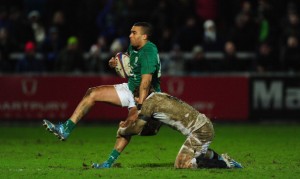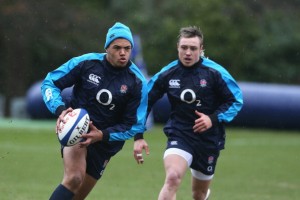
Getting his fingers burnt: Freddie Burns failed to make an impact with his boot or his passing for the Saxons
By Charlie Morgan
Saturday was Burns Night. But only the Irish celebrated it at Kingsholm. In fact, given what went on during England Saxons’ narrow defeat to Joe Schmidt’s second string, an excruciating irony filled the West Country air.
The very last second encapsulated everything. With his side 14-8 down to Irish Wolfhounds, Freddie Burns saw a gap down the undefended blind-side of a ruck barely two metres out from the try-line. It was fine opportunism, but over-eagerness saw the ball slip out of play and into the touch-judge’s midriff. As Burns buried his head in the turf and referee Ian Davies blew the final whistle, the scene looked cruelly comic.
Two weeks previously, Stuart Lancaster had rung Burns to let the mercurial fly-half know he would not be included in England’s initial Six Nations squad. Instead, after a jittery start to the domestic and European season, the 23 year-old would have an evening to prove his form against the Wolfhounds.
As Burns acknowledged last week in Loughborough with typical honesty, it was a difficult call to take – but one that refocused him on the goal of adding to his three Test caps. “Sometimes you have to take it on the chin and hope bad experiences make you a better player and a better person,” were the exact words.
Sadly, Burns’s brief – taming the Irish with clinical game management and guiding his team to victory over a squad decorated with 17 full internationals – didn’t go to plan. That’s a fairly generous understatement.
After four minutes, Isaac Boss took advantage of spatial uncertainty around a driving maul to scamper over past Burns’s left shoulder. Attempting to make amends, the Saxons’ pivot flung out several wide passes. Rather than release Charlie Sharples and Elliot Daly though, they slowed on the wind and stunted momentum. Resorting to his boot, Burns saw a grubber blocked before an over-hit chip relinquished possession. A pair of misses from the tee in either half compounded matters – a familiar trend this term.
In short, Burns was consumed by anxiety for the first hour. Wolfhounds ten Ian Madigan offered a striking contrast. Having also fallen out of favour at club level – seeing Jimmy Gopperth usurp him as first choice with Leinster – he appeared assured, nailing two conversions and dotting down himself following a sharp tap-penalty.
A few things conspired against Burns – immense industry and muscularity from the Irish pack and Joe Simpson’s slightly scrappy service – but the overriding problem was clearly psychological. On his old stomping ground, there was an individual onus on him that was just too tough to deal with. It meant too much. Trying to fight out of the claustrophobia, Burns forced things and overplayed his hand. If their half-backs take the right options regularly, a team should not lose after enjoying 63 per cent possession and 66 per cent territory. Those statistics are pretty stark.
Lancaster, a spectator on Saturday, knows that. But crucially, Burns will be well aware of his shortcomings too. He is a quick learner and his own harshest critic – that was apparent from the final 20 minutes when he landed a penalty to bring the Saxons within striking distance before nearly rescuing a result. Replacements Elliot Stooke and superb Sam Dickinson presented a sturdier platform and Burns responded well, tightening things up and conducting punchy phase-play. Despite the dancing feet of Simon Zebo, Wolfhounds were on the ropes.
Problem solving is a key quality in international fly-halves and Burns showed admirable character, communication and leadership to aid Saxons’ resurgence. As for that blunder at the death, Twitter was awash with ridicule as keyboard warriors delighted in his failure. Irish site Balls.ie was kind enough to post a video of the incident and compel watchers to “gather round and laugh at Freddie Burns” – classy. Armchair critics have it easy when it comes to ambitious players. The same people who moan about England’s lack of imagination are usually quick to pile into anyone who tries something new – it’s a mundane hypocrisy.
The truth is, it took a decent blend of vision and bottle for Burns to back himself, not only to cross the whitewash but also to kick a touchline conversion for an unlikely win. It was execution, not decision-making, which let him down. Ask any coach – you’d rather somebody on your team with faith in their skills who is ballsy enough to seize the moment.
Such confidence is usually infectious and could have been important on Saturday in Paris when it is likely that at least two debutants – Luther Burrell and one of Jack Nowell and Anthony Watson – will be in England’s match-day 23. As it is, Lancaster has chosen to retain the pragmatic pair of George Ford and Stephen Myler, and Burns has another week in the Saxons against Scotland A at Scotstoun.
But he will not stay out in the cold for long. For England to seriously challenge in 2015, they need to score tries. When calm and comfortable, Burns has the spark to trouble any defence. Remember his first touch in a Test match 13 months ago? He took it to the line, committed a couple of All Black defenders and ignited a move that would have brought a five-pointer if Mike Brown had pinned his ears back.
Time is a healer, and one week out of intense Six Nations limelight should work wonders. Lancaster’s door is never locked, certainly not to a man of talent and upbeat attitude. An improved performance up in Glasgow on Friday can still open it before the Six Nations has ended. A difficult Burns Night might yet be the making of young Freddie.







